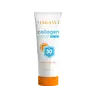What's inside
What's inside
 Key Ingredients
Key Ingredients

 Benefits
Benefits

 Concerns
Concerns

 Ingredients Side-by-side
Ingredients Side-by-side

Water
Skin ConditioningCyclopentasiloxane
EmollientZinc Oxide
Cosmetic ColorantSilica
AbrasiveDimethicone
EmollientTriethoxysilylethyl Polydimethylsiloxyethyl Hexyl Dimethicone
Skin ConditioningLauryl PEG-9 Polydimethylsiloxyethyl Dimethicone
Skin ConditioningEthylhexyl Methoxycinnamate
UV AbsorberIsononyl Isononanoate
EmollientPolymethylsilsesquioxane
Butylene Glycol
HumectantDiethylamino Hydroxybenzoyl Hexyl Benzoate
UV FilterAcrylates Copolymer
Glycerin
HumectantLauroyl Lysine
Skin ConditioningMethylparaben
PreservativePropylparaben
PreservativeDisodium EDTA
Tocopheryl Acetate
AntioxidantSodium Hyaluronate
HumectantSodium Acetylated Hyaluronate
HumectantPanthenol
Skin ConditioningDipotassium Glycyrrhizate
HumectantHydrolyzed Collagen
EmollientWater, Cyclopentasiloxane, Zinc Oxide, Silica, Dimethicone, Triethoxysilylethyl Polydimethylsiloxyethyl Hexyl Dimethicone, Lauryl PEG-9 Polydimethylsiloxyethyl Dimethicone, Ethylhexyl Methoxycinnamate, Isononyl Isononanoate, Polymethylsilsesquioxane, Butylene Glycol, Diethylamino Hydroxybenzoyl Hexyl Benzoate, Acrylates Copolymer, Glycerin, Lauroyl Lysine, Methylparaben, Propylparaben, Disodium EDTA, Tocopheryl Acetate, Sodium Hyaluronate, Sodium Acetylated Hyaluronate, Panthenol, Dipotassium Glycyrrhizate, Hydrolyzed Collagen
Water
Skin ConditioningEthylhexyl Methoxycinnamate
UV AbsorberDiethylamino Hydroxybenzoyl Hexyl Benzoate
UV FilterNeopentyl Glycol Diheptanoate
EmollientButylene Glycol
HumectantEthylhexyl Triazone
UV AbsorberTris-Biphenyl Triazine
UV AbsorberButyl Methoxydibenzoylmethane
UV AbsorberNiacinamide
SmoothingBis-Ethylhexyloxyphenol Methoxyphenyl Triazine
Skin ConditioningButyloctyl Salicylate
Skin ConditioningInositol
HumectantOctocrylene
UV AbsorberGlycine Soja Oil
EmollientPhenoxyethanol
PreservativePolyester-7
Skin ConditioningAcrylates/C10-30 Alkyl Acrylate Crosspolymer
Emulsion StabilisingDecyl Glucoside
CleansingCarbomer
Emulsion StabilisingDisodium EDTA
Polyglyceryl-3 Diisostearate
EmulsifyingSodium Polyacrylate
AbsorbentHydrogenated Polydecene
EmollientLactobacillus/Collagen Ferment Filtrate
HumectantLecithin
EmollientOryza Sativa Germ Extract
EmollientSodium Hydroxide
BufferingTocopheryl Acetate
AntioxidantTriethylene Glycol
MaskingDisodium Phosphate
BufferingTrideceth-6
EmulsifyingXanthan Gum
EmulsifyingArtemisia Vulgaris Extract
Skin ConditioningWater, Ethylhexyl Methoxycinnamate, Diethylamino Hydroxybenzoyl Hexyl Benzoate, Neopentyl Glycol Diheptanoate, Butylene Glycol, Ethylhexyl Triazone, Tris-Biphenyl Triazine, Butyl Methoxydibenzoylmethane, Niacinamide, Bis-Ethylhexyloxyphenol Methoxyphenyl Triazine, Butyloctyl Salicylate, Inositol, Octocrylene, Glycine Soja Oil, Phenoxyethanol, Polyester-7, Acrylates/C10-30 Alkyl Acrylate Crosspolymer, Decyl Glucoside, Carbomer, Disodium EDTA, Polyglyceryl-3 Diisostearate, Sodium Polyacrylate, Hydrogenated Polydecene, Lactobacillus/Collagen Ferment Filtrate, Lecithin, Oryza Sativa Germ Extract, Sodium Hydroxide, Tocopheryl Acetate, Triethylene Glycol, Disodium Phosphate, Trideceth-6, Xanthan Gum, Artemisia Vulgaris Extract
 Reviews
Reviews

Ingredients Explained
These ingredients are found in both products.
Ingredients higher up in an ingredient list are typically present in a larger amount.
Butylene Glycol (or BG) is used within cosmetic products for a few different reasons:
Overall, Butylene Glycol is a safe and well-rounded ingredient that works well with other ingredients.
Though this ingredient works well with most skin types, some people with sensitive skin may experience a reaction such as allergic rashes, closed comedones, or itchiness.
Learn more about Butylene GlycolDiethylamino Hydroxybenzoyl Hexyl Benzoate (DHHB) is a chemical UV-A absorber. It is formulated for high UVA protection (320-400 nm).
DHHB is well-liked for:
DHHB has been approved by the EU, Japan, Taiwan, and South America for use up to 10%. Unfortunately, it has not been approved for use in the US or Canada due to slow regulatory processes.
This ingredient is soluble in oils, fats, and lipids.
Learn more about Diethylamino Hydroxybenzoyl Hexyl BenzoateDisodium EDTA plays a role in making products more stable by aiding other preservatives.
It is a chelating agent, meaning it neutralizes metal ions that may be found in a product.
Disodium EDTA is a salt of edetic acid and is found to be safe in cosmetic ingredients.
Learn more about Disodium EDTAEthylhexyl Methoxycinnamate is an organic compound that provides UVB protection. It often goes by the more common name of octinoxate. It is created from methoxycinnamic acid and 2-ethylhexanol.
Ethylhexyl Methoxycinnamate absorbs UVB rays with wavelengths between 280-320 nm. UV absorbers protect your skin by using chemical reactions to convert UV rays into heat and energy.
UVB (290-320 nm) rays emit more energy than UVA rays. They are capable of damaging DNA, causing sunburns and are thought to be linked to skin cancer.
The state of Hawaii has banned sunscreens containing octinoxate due to its potential impact on coral reefs. More research is needed to bridge gaps in this research. The European Union allows higher levels of octinoxate in sunscreens than the US and Australia.
Ethylhexyl Methoxycinnamate is oil soluble. It is not stable and may lose efficacy when exposed to sunlight.
Learn more about Ethylhexyl MethoxycinnamateTocopheryl Acetate is AKA Vitamin E. It is an antioxidant and protects your skin from free radicals. Free radicals damage the skin by breaking down collagen.
One study found using Tocopheryl Acetate with Vitamin C decreased the number of sunburned cells.
Tocopheryl Acetate is commonly found in both skincare and dietary supplements.
Learn more about Tocopheryl AcetateWater. It's the most common cosmetic ingredient of all. You'll usually see it at the top of ingredient lists, meaning that it makes up the largest part of the product.
So why is it so popular? Water most often acts as a solvent - this means that it helps dissolve other ingredients into the formulation.
You'll also recognize water as that liquid we all need to stay alive. If you see this, drink a glass of water. Stay hydrated!
Learn more about Water